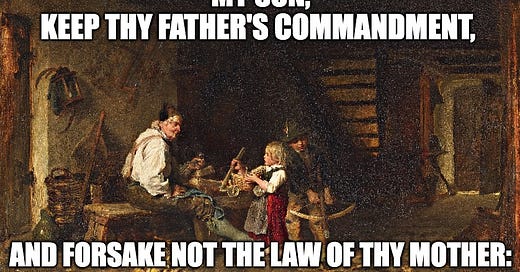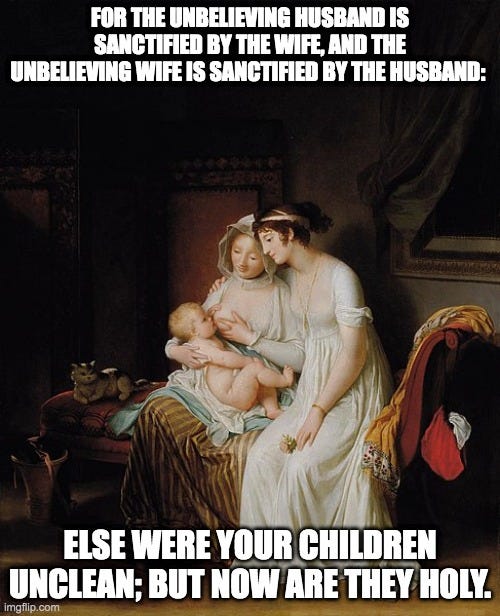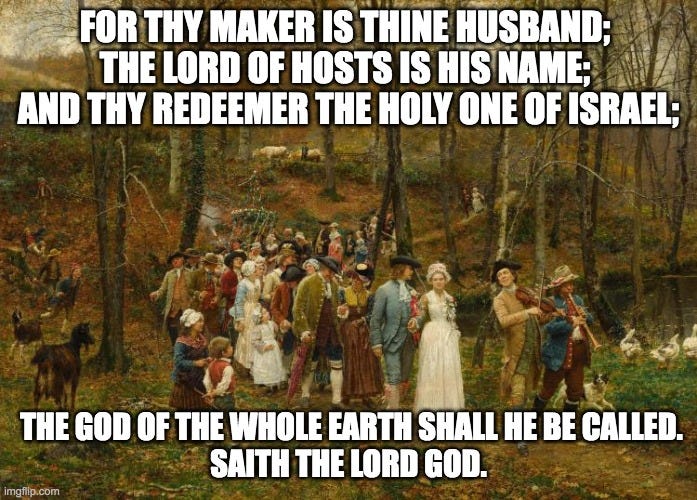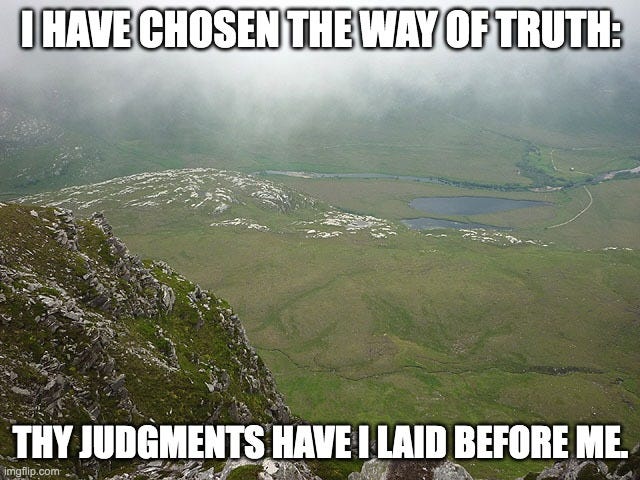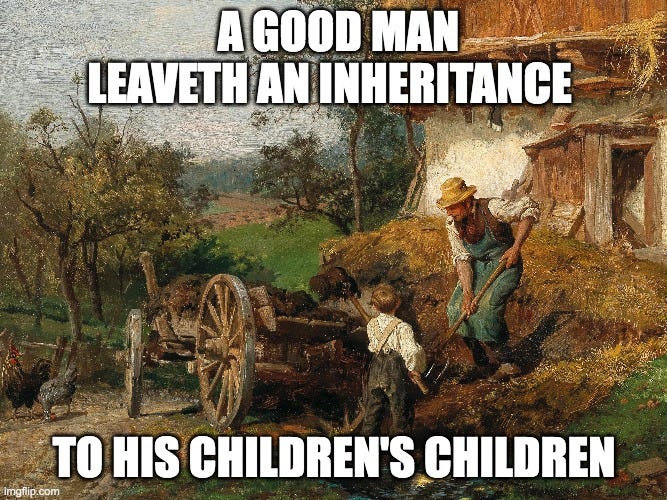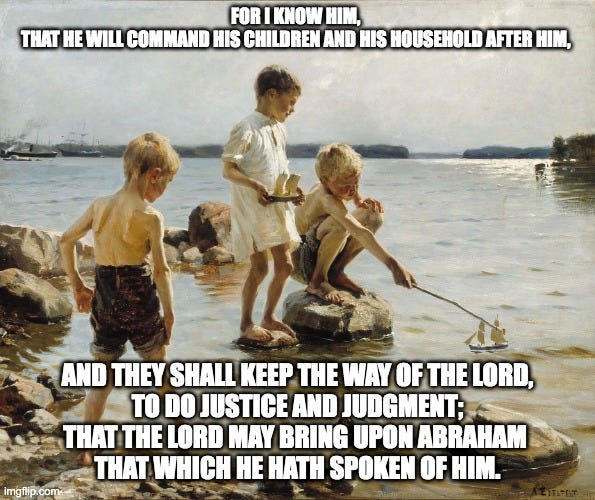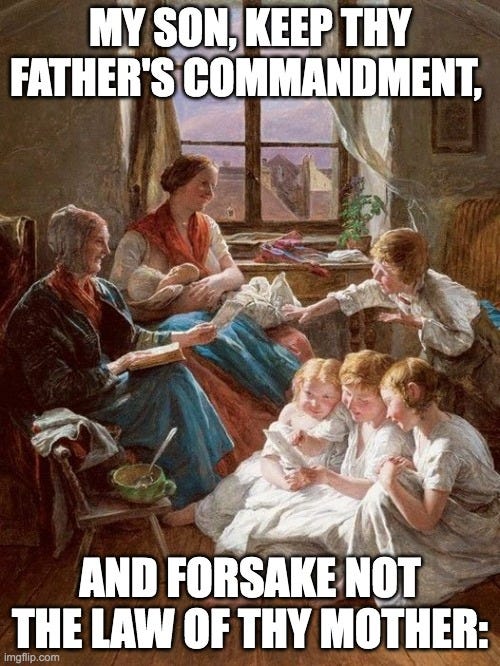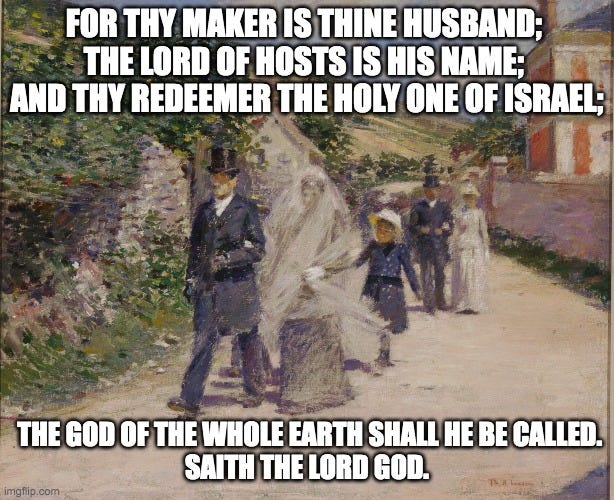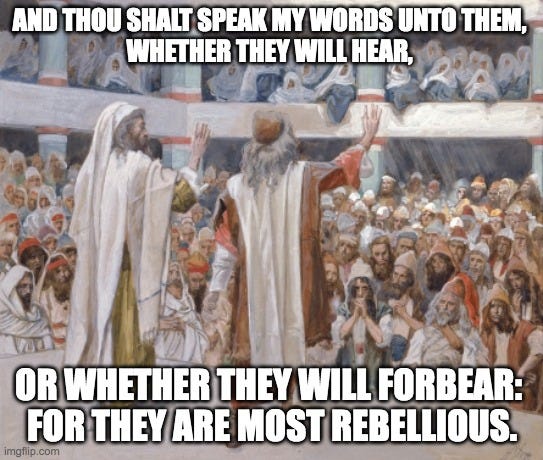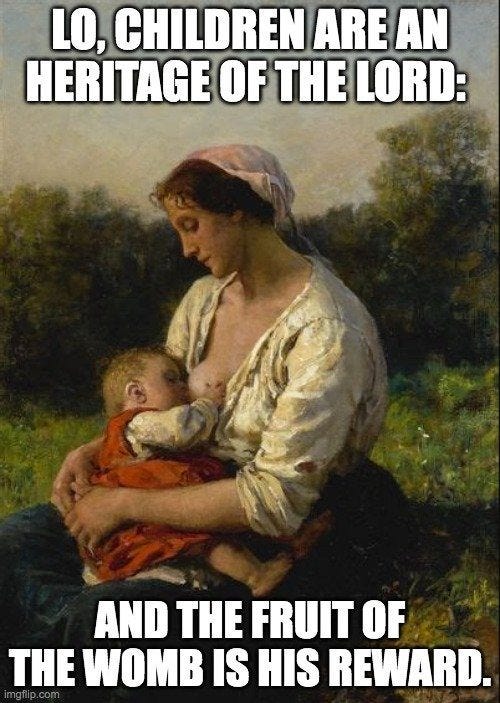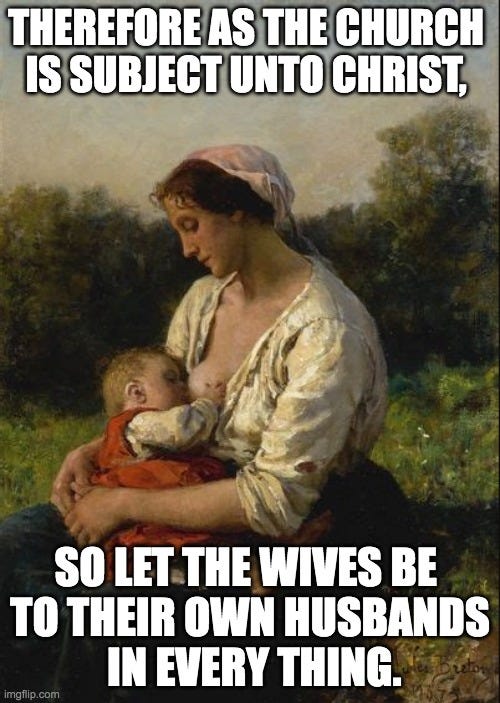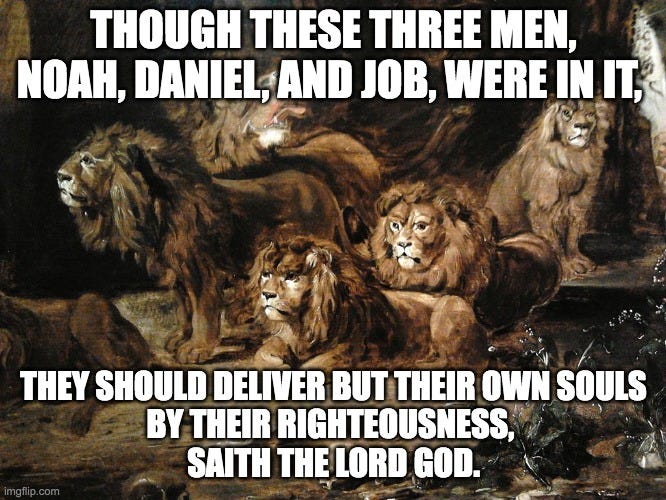One of the most important inquiries whenever we are looking at the issue of authorities is that of ‘jurisdiction’. Assuming that a given man is an authority, which is a study that needs doing, the next question we need to ask is, “An authority of who? What? For how long?”
Introduction
And if it seem evil unto you to serve the LORD, choose you this day whom ye will serve; whether the gods which your fathers served that were on the other side of the flood, or the gods of the Amorites, in whose land ye dwell: but as for me and my house, we will serve the LORD.
Joshua 24:15
In the continuing study and debate about Jeremiah 35: Jonadab, the son of Rechab, and his sons, the issue of jurisdiction is paramount. In order to understand the blessing that God pronounced upon Jonadab, the son of Rechab, and his offspring, and the curses which He (God) pronounced upon Israel, it important to understand both jurisdictions: the jurisdiction of God over Israel, and the jurisdiction of Jonadab over his children.
My good friend, in his un-post about Jonadab, brings forward a metaphor which, in his eyes, is in some ways equivalent to the issues in the story in Jeremiah 35:
(1) The Lord spoke to Jeremiah when Jehoiakim son of Josiah was ruling over Judah. (2) “Go to the The First Baptist Church. Invite them to come into one of the side rooms of the Lord’s temple and offer them some wine to drink… (5) Then I set cups and pitchers full of wine in front of the members of the First Baptist Church and said to them, “Have some wine.” (6) But they answered, “We do not drink wine because our Pastor of First Baptist Church commanded us not to. He told us, ‘You and your children must never drink wine. (7) Do not build houses. Do not plant crops. Do not plant a vineyard or own one. Live in tents all your lives. If you do these things you will live a long time in the land that you wander about on.’ (8) We and our wives and our sons and daughters have obeyed everything The Pastor of First Baptist Church commanded us. We have never drunk wine. (9) We have not built any houses to live in. We do not own any vineyards, fields, or crops. (10) We have lived in tents. We have obeyed The Pastor of First Baptist Church and done exactly as he commanded us…
(12) Then the Lord spoke to Jeremiah. (13) The Lord God of Israel who rules over all told him, “Go and speak to the Church in America. Tell them, ‘I, the Lord, say: “You must learn a lesson from this about obeying what I say! (14) The Pastor of First Baptist Church ordered his Church members not to drink wine. His orders have been carried out. To this day his Church members have drunk no wine because they have obeyed what their Elder commanded them. But I have spoken to you over and over again, but you have not obeyed me! (15) I sent all my servants the prophets to warn you over and over again. They said, “Every one of you, stop doing the evil things you have been doing and do what is right. Do not pay allegiance to other gods and worship them. Then you can continue to live in this land that I gave to you and your ancestors.” But you did not pay any attention or listen to me. (16) Yes, First Baptist Church have carried out the orders that their Pastor gave them. But you people have not obeyed me! (17) So I, the Lord, the God who rules over all, the God of Israel, say: “I will soon bring on the Church in America all the disaster that I threatened to bring on them. I will do this because I spoke to them but they did not listen. I called out to them but they did not answer.”’”
Now, to my mind, this story needs some changes and assumptions to really fit the case. So I am going to go through these changes one by one in order to bring this example closer to the Biblical one.
Some Assumptions and Obvious Changes
So, first of all I am going to list some of the things that were present in the case of Jeremiah, that are missing in the case he presents. Most of these are either trivial or obvious, but I still think it is worthwhile to point them out:
It couldn’t be Jeremiah, obviously. Unless the Lord resurrected Jeremiah, or brought forward another prophet named Jeremiah who worked in the United States of our age, it wouldn’t be Jeremiah.
The cannon is now closed. I, at least, don’t believe that there can be another prophet which could speak in quite the same authoritative way to the United States Church. This would be a long discussion, but I’m just putting it in there.
The United States Church has not been around for the 300 years that, I believe, was the time gap between Jonadab and Jeremiah. Although I suppose if we count the pre-formation of the country stage, there might possibly be a ‘First Baptist Church’ which was around then, and we could count ‘America’ even before we became a country. But the event mentioned, the giving of the command, would have happened 300 or so years ago to fit our parallel.
There are some other trivial changes that should be made. Like changing ‘The Lord God of Israel’ to ‘The Lord God of America’. Which is true, if a bit Biblically iffy to state in quite that way without explanation.
‘The land I gave you and your ancestors’ might need a bit of explanation as well, since the land of Israel was more directly and overtly given by God than America was.
Substitute America for Israel, and Washington for Jerusalem elsewhere as well. Put in the name of a president for ‘Jehoiakim’ etc.
The Exception
It sometimes gets missed, but while the Rechabites had not drank wine all those years, they had put a pause on their obedience in the matter of houses during the invasion by Nebecaudnezzer. See Jeremiah 35:11. So the command that was set down was not some ‘blind obedience’ thing, which they followed stupidly.
And for some reason my friend leaves that verse out of his ‘translation’.
Elders
Let every soul be subject unto the higher powers. For there is no power but of God: the powers that be are ordained of God.
Whosoever therefore resisteth the power, resisteth the ordinance of God: and they that resist shall receive to themselves damnation.
Romans 13:1-2
This point is perhaps a little more significant, and a lot less obvious. Assuming that the church that he is using as an example was properly constituted (and we have no reason to believe that Jonadab was, in some ways, an illegitimate father over the children that obeyed him, or just pretending to be the father, etc.) then the correct authority here would be ‘the elders’ not ‘the pastor’.
This point is particularly important if the name of the church is ‘The First Baptist Church’, because many Baptist churches are improperly constituted, authority wise. The mistake might have been a little more obvious if he had said, “Grace Presbyterian Church”, as they do tend to have a plurality of elders. (As do many Baptist churches, but it is, unfortunately, more rare).
Remember he is trying to make an analog of the position in Jeremiah, and nowhere is there any hint of any falsehood in the fatherhood of Jonadab.
Jurisdiction
Render therefore to all their dues: tribute to whom tribute is due; custom to whom custom; fear to whom fear; honour to whom honour.
Romans 13:7
Next we have to deal with the issue of the jurisdiction of the order: what it was about. Fathers, in Scripture, have a much wider and more intimate authority over their children than elders do over their flock. We can argue the boundaries of both; indeed we will do so, I am sure, but if we are going to make an accurate analogy, we need to start with something that is clearly within the jurisdiction of the church, and not merely take the instructions of a father whole cloth. The father may take his son over his knee; we would all be surprised if a modern elder did so to one of his congregants.
So, for Biblical accuracy and modern sensibilities, we need to change the analogy to something clearly in the realm of the authority of the church elders. I am going to change it to this: The location of Sunday School classes. Delete from the example the drinking of wine, living in houses, planting of vineyards and all that. They are family jurisdiction, and they are not church jurisdiction.
And delete ‘your children’ as well. I don’t believe that the most ardent Presbyterian believes that the elders have the authority to bind future generations in the family sense.
Rewrite
Obey them that have the rule over you, and submit yourselves: for they watch for your souls, as they that must give account, that they may do it with joy, and not with grief: for that is unprofitable for you.
Hebrews 13:17
So, to rewrite the analogy, you would have that the the elders of Grace Presbyterian Church got together according to the rules of their church and their synod, discussed a problem or potential problem in their church and duly passed, according to their rules, the following command:
No Sunday School class shall ever be held in the Sanctuary of Grace Presbyterian Church, from now until the Lord takes us home or the church burns down.
And then three hundred years go down and, skipping over the problem of the lack of Biblical warrant for a modern-day equivalent of Jeremiah,
an inspired prophet named Jack goes to Grace Presbyterian 300 years later, walks into the sanctuary and says to the elders, “Let’s have a Sunday School class in here today.”
And they say, “We will not have Sunday School class in the Sanctuary. For our elders, 300 years ago, commanded us saying, ‘Ye shall not have Sunday School in the sanctuary’ and, except for that one time when the Old Testament class had to meet here because their room had had a fire, and there was a blizzard outside, we have never had Sunday School class in the sanctuary. (There are lots of other rooms available, however.)”
And then let us say that Jack goes to the Washington Monument, or the Capital steps, or on the evening news, and makes this pronouncement:
Do you see this, America? One board of elders, 300 years ago, made a ruling about Sunday School, and the elders of their church, 300 years later, are still obeying it! Yet God has sent prophet after prophet to you, year after year, but you have continued in your evil ways! Surely God will punish you as a nation, and as a city!
And then he turns to the congregation of Grace Presbyterian, as they stand off on the side and says,
And surely God will bless your congregation, all down through the ages!
Re-examination
The centurion answered and said, Lord, I am not worthy that thou shouldest come under my roof: but speak the word only, and my servant shall be healed.
For I am a man under authority, having soldiers under me: and I say to this man, Go, and he goeth; and to another, Come, and he cometh; and to my servant, Do this, and he doeth it.
When Jesus heard it, he marvelled, and said to them that followed, Verily I say unto you, I have not found so great faith, no, not in Israel.
And I say unto you, That many shall come from the east and west, and shall sit down with Abraham, and Isaac, and Jacob, in the kingdom of heaven.
But the children of the kingdom shall be cast out into outer darkness: there shall be weeping and gnashing of teeth.
And Jesus said unto the centurion, Go thy way; and as thou hast believed, so be it done unto thee. And his servant was healed in the selfsame hour.
Matthew 8:8-13
So now let us look back at my friend’s idea of re-stating what happened in Jeremiah in terms of a different jurisdiction. I think it works as long as it is properly translated. Moving from the family to the church jurisdiction, or we could do the same thing for the government jurisdiction, it works. If we keep the thing commanded within the jurisdiction of the person doing the commanding, if we ignore the lack of authoritative prophets nowadays, if we add in the time frame… it works.
Surely, there are congregations, nations, and families who are obeying, however imperfectly, commands that have been sent down to them over the ages, commands set down by authorities God has set over them. Surely, those congregations, nations, and families stand as witnesses against their larger culture, which consistently acts against God's will, despite the many ways He has communicated with them.
And surely we need to learn from both. We need to be that obedient son, congregant, and citizen… following the lawfully given commands of those in authority over us. And surely we need to see, and repent, of the many ways in which we, and our society, stand in rebellion to God.
Surely, this is a good lesson.
Addendum
A couple of quick additions to the above posted that I noticed after it was published. The first would be that I noticed that my friend left out a couple of sections in his rewriting. He left out both the time that the Rechabites live din houses, which says something about the way they (and God) understood their obedience; and he left out the concluding blessing.
I also noticed that in changing the first jurisdiction (that of Jonadab) from the family to the church (ie from the authority of a father to the authority of a pastor) he also changed the second jurisdiction from that of a nation to that of a kind of vague church. (The ‘Church in America’). So the original points out the obedience of a family to a family leader, and contrasts that with the disobedience of a nation to God. His translation changes the obedience of a church to their church leaders, and contrasts it with the disobedience of a vague spiritual subset of the church universal to God.
This is really a pretty profound difference. I think the metaphor would definitely work best if the change was made (as I made, without noticing I was making it) from the church to the nation.
Thank you for reading Von’s Substack. I would love it if you commented! I love hearing from readers, especially critical comments. I would love to start more letter exchanges, so if there’s a subject you’re interested in, get writing and tag me!
Being ‘restacked’ and mentioned in ‘notes’ is very important for lesser-known stacks so… feel free! I’m semi-retired and write as a ministry (and for fun) so you don’t need to feel guilty you aren’t paying for anything, but if you enjoy my writing (even if you dramatically disagree with it), then restack, please! Or mention me in one of your own posts.
If I don’t write you back it is almost certain that I didn’t see it, so please feel free to comment and link to your post. Or if you just think I would be interested in your post!
If you get lost, check out my ‘Table of Contents’ which I try to keep up to date.
Von also writes as ‘Arthur Yeomans’. Under that name he writes children’s, YA, and adult fiction from a Christian perspective. His books are published by Wise Path Books and include the children’s/YA books:
The Bobtails meet the Preacher’s Kid
and
As well as GK Chesterton’s wonderful book, “What’s Wrong with the World”, for which ‘Arthur’ wrote most of the annotations.
Arthur also has a substack, and a website.
Thanks again, God Bless, Soli Deo gloria,
Von
Links
Some posts very specifically about Jonadab, the son of Rechab
Jonadab, the Son of Rechab
·
22 JULY 2024
The words of jonadab
·
6 AUGUST 2024
The Context of Jonadab
·
13 AUGUST 2024
And Jeremiah said unto the house of the Rechabites, Thus saith the LORD of hosts, the God of Israel;
Three Godly Fathers
·
15 JUNE 2024
Related Issues
Other posts dealing with the meanings of the words obey, submit, command… and how these are worked out in Scripture.
Honour Thy Father: Adam to Abraham
·
3 OCTOBER 2024
Then came to Jesus scribes and Pharisees, which were of Jerusalem, saying,
Trust... and Obey
·
11 MAY 2024
Trust, Honour, and Obey
·
21 MAY 2024
As Sarah Obeyed Abraham...
·
23 MAY 2024
Obey: Appendix
·
21 MAY 2024
Submission in Silence
·
15 JUNE 2024
Parthenogenic Parenting
·
17 FEBRUARY 2024
Problems with Patterns of Patriarchy
·
10 JULY 2023
Functional Obedience
·
30 MAY 2024
Judging the Patriarchs
·
8 JUNE 2024

